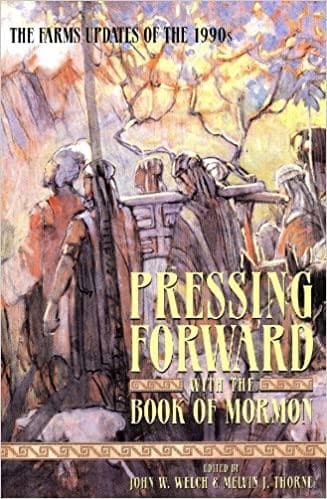Book
69 Chapters

“I know that I am a visionary man; for if I had not seen the things of God in a vision I should not have known the goodness of God.” (1 Nephi 5:4)
In the Book of Mormon, Lehi is three times referred to as “a visionary man” (1 Nephi 2:11; 5:2, 4). The term does not appear in the King James Version of the Bible, but is nonetheless authentic. It is the Hebrew word ḥôzeh, the active participle of the root from which derive ḥazôn and ḥizzāyôn, “vision” (see 2 Samuel 24:11; 1 Chronicles 21:9; 25:5; 2 Chronicles 9:29; 12:15; 19:2; 29:25, 30; 35:15; Amos 7:12). In each case, the King James Version translates the term as “seer,” which is the same as the KJV rendering for rôʾeh (from the verb to see), used of the prophet Samuel in 1 Samuel 9:9, 11, 19; 1 Chronicles 9:22; 26:28; 29:29, of the priest Zadok in 2 Samuel 15:27, and of the prophet Hanani in 2 Chronicles 16:7, 10 (Hanani is termed a ḥôzeh in 2 Chronicles 19:2).
Both Hebrew roots have the verbal meaning of “to see,” but it is likely that ḥôzeh is behind the Book of Mormon term visionary man, while rôʾeh is probably the word behind seer in 2 Nephi 3:6—7, 11, 14 and Mosiah 8:13—17. The latter passage, along with Mosiah 28:13—16 and Joseph Smith—History 1:35, indicates that the term seer was used by the Nephites to designate one who had power to use the interpreters, which have come to be known to us as the Urim and Thummim.
In the Book of Mormon, both Lehi’s wife and his elder sons derisively call him “a visionary man.” In response to Sariah, Lehi said, “I know that I am a visionary man; for if I had not seen the things of God in a vision I should not have known the goodness of God” (1 Nephi 5:4). In Amos 7:12, Amaziah, priest of the apostate shrine erected at Bethel by King Jeroboam, uses the term when addressing the prophet Amos, telling him, “O thou seer, go, flee thee away into the land of Judah.” Amos’s response is similar to that of Lehi: “I was no prophet, neither was I a prophet’s son; but I was an herdman, and a gatherer of sycomore fruit: and the Lord took me as I followed the flock, and the Lord said unto me, Go, prophesy unto my people Israel” (Amos 7:14—15).
Lehi’s visionary powers were again manifest when he told his family, “Behold, I have dreamed a dream; or, in other words, I have seen a vision” (1 Nephi 8:2; compare 8:36).1 The idiom “dreamed a dream” is clearly an example of the cognate accusative, known from Hebrew2 and other ancient languages, in which the verb is followed by a noun (here used as direct object or accusative) deriving from the same root. From this, it also seems likely that the words “seen a vision” represent another cognate accusative. We can illustrate this by rendering the English as “seen a scene,” “vised a vision,” or “envisioned a vision.” It is likely that the original read ḥāzîtî ḥāzôn, using a verb and noun deriving from the same root as ḥôzeh, “visionary.”3 The fact that this Hebrew root is found in cognate constructions in both Isaiah 1:1 and Ezekiel 12:27; 13:7, 16 adds strength to this suggestion.
Research by John A. Tvedtnes, originally published in the Journal of Book of Mormon Studies 6/2 (1997): 260—61.
1. For a tie between dreams and visions, see Job 33:15; Isaiah 29:7; Daniel 1:17.
2. The Hebrew idiom is found in Genesis 37:5, 9; 40:5, 8; 41:11; Deuteronomy 13:3; Judges 7:13; Daniel 2:3.
3. I realize that this view is at variance with Nibley’s suggestion that the term visionary used in reference to Lehi was the same as ha-piqqeaḥ found in one of the Lachish letters; see Hugh W. Nibley, The Prophetic Book of Mormon, ed. John W. Welch (Salt Lake City: Deseret Book and FARMS, 1989), 393—94. But ha-piqqeaḥ really refers to one whose eyes are open. In my opinion, the fact that ḥôzeh derives from the same root as the word for vision makes it a better candidate.
Book
69 Chapters
Items in the BMC Archive are made publicly available for non-commercial, private use. Inclusion within the BMC Archive does not imply endorsement. Items do not represent the official views of The Church of Jesus Christ of Latter-day Saints or of Book of Mormon Central.